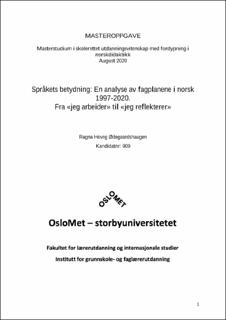Språkets betydning: En analyse av fagplanene i norsk 1997-2020. Fra "jeg arbeider" til "jeg reflekterer"
Master thesis
Published version
Permanent lenke
https://hdl.handle.net/11250/2759190Utgivelsesdato
2020Metadata
Vis full innførselSamlinger
Sammendrag
Denne masteroppgaven behandler kompetansemålene i fagplanen i norsk i læreplanene fra 1997, 2006, 2013 og 2020. Formålet med oppgaven er å undersøke hvilke syn på kunnskap og dannelse en finner i disse kompetansemålene i norskfaget i disse læreplanene, og hvilken eventuell utvikling som har skjedd i perioden. Gjennom en kombinasjon av kvantitativ innholdsanalyse og diskursanalyse av kompetansemålene avdekkes endringer knyttet til både syn på dannelse og kunnskap i nevnte fagplaner. Oppgaven argumenterer for at faktorer som kan ha påvirket denne utviklingen er PISA sin taksonomi, i tillegg til både Nasjonale Prøvers og Blooms taksonomi. Videre viser analysene at Literacy-begrepet også kan ha spilt en avgjørende rolle i denne utviklingen. Denne oppgaven argumenterer for at norskfaget har utviklet seg til å i dag preges av at det er ferdigheter og ikke innhold elevene skal tilegne seg, og at det er praktisk kunnskap som vektlegges i dagens fagplan i norskfaget. Dette hevdes videre å ha en konsekvens for hvilket syn på dannelse en finner i dagens norskfag. Videre blir det argumentert for at literacy-begrepet muligens har erstattet både begrepene kunnskap og dannelse i kompetansemålene i Fagfornyelsen. Resultatet av analysene viser også klare tendenser til en utvikling av en globalisering av norskfaget, der den norske virkeligheten har fått redusert sin tilstedeværelse i fagplanen. This master thesis consists of a combination of a quantitative content analysis and a discourse analysis of the competence goals in the Norwegian curriculum from 1997- 2020 in the Norwegian L1 language. The aim of the thesis is to attempt to uncover what views the curriculum represents, connected to the term knowledge and the term formation. The thesis also discusses what kind of development has taken place during the period. The competence goals and the verbs used are the focus of the analysis in the mentioned curriculum. The results of the analysis will be discussed in light of relevant theory. Through a combination of quantitative content analysis and a discourse analysis I have uncovered changes connected to both knowledge and formation during the period in the aforementioned curriculum. Factors that may have influenced this development is different taxonomies; PISA and their Reading Proficiency Levels, Bloom’s taxonomy and the National Tests that is conducted by the Norwegian government. In addition, the development of the term literacy might have played its part as well. The thesis concludes that the curriculum of the L1 language subject today is characterized by a practical approach to knowledge; the development of students’ skills is a primary goal for the subject. The thesis also argues that this has a consequence for what kind of formation one finds in the subject. In addition, the literacy-term has possibly replaced both knowledge and formation in the competence goals. Furthermore, the results of the analysis show that the L1 Language subject is now more than ever an international subject, with very few references to a Norwegian reality.
